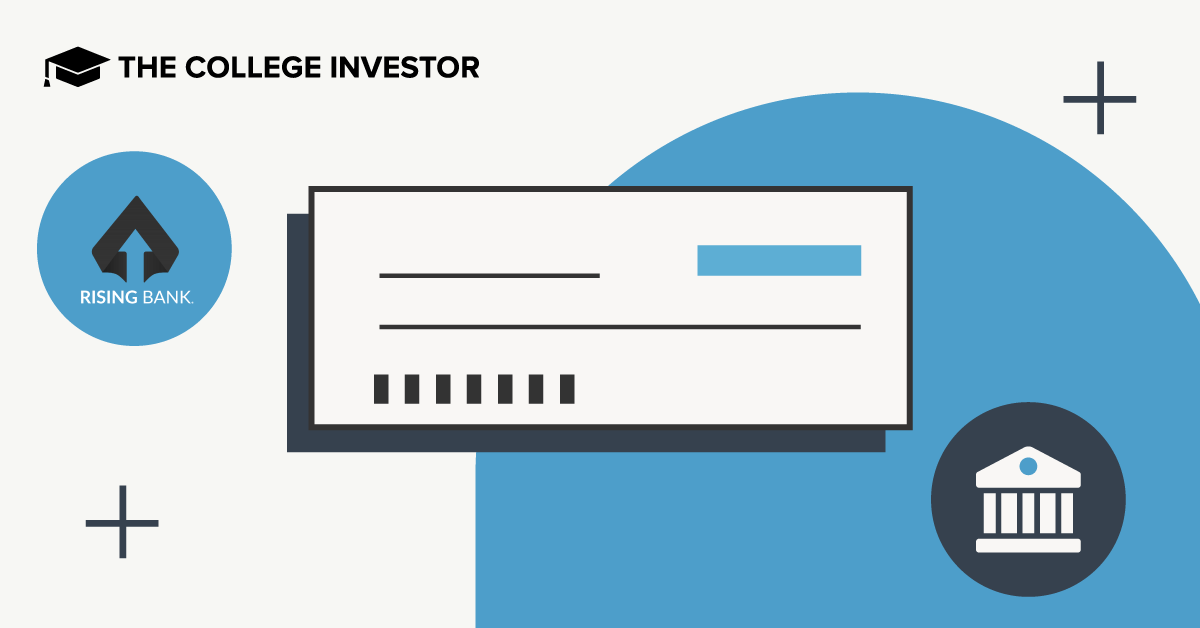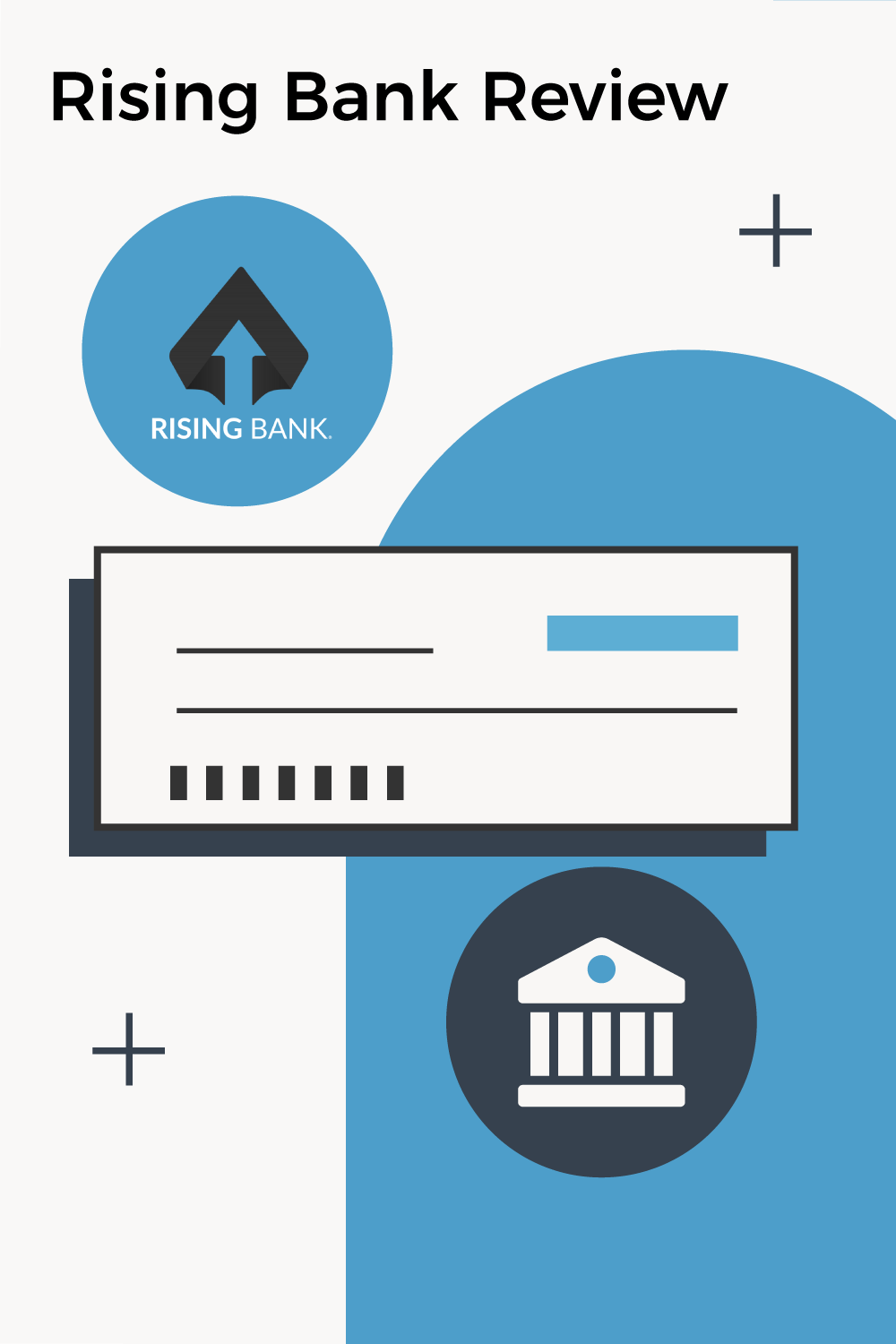
Rising Bank is an online bank offering competitive yields on its savings and CD accounts. It also offers an interest-bearing checking account, which you can't get with many traditional, brick and mortar banks.
However, with a somewhat high minimum balance requirement, how does Rising Bank compare to other leading online banks, such as Ally or CIT Bank? And do they offer other perks that people have come to expect from the best online banks?
We answer those questions and more in this Rising Bank review.
Rising Bank Details | |
|---|---|
Product Name | High-Yield Savings, Checking, CDs |
Monthly Fees | None |
Minimum Balance | $1,000 |
Savings APY | 5.00% |
Promotions | None |
What Is Rising Bank?
Rising Bank is the online banking division of Midwest BankCentre, which is a community bank based in St. Louis, Missouri. While Midwest BankCentre has been around in some form since 1906, Rising Bank was launched in 2018.
What Does It Offer?
Rising Bank offers many different types of financial products, including business loans, mortgages, and home equity loans. It even offers an insurance marketplace, with connections to over 40 insurance partners. But for the purposes of this review, I’m focusing on the personal deposit account products.
High-Yield Savings Account
Rising Bank’s high-yield savings account offers an attractive APY, currently at 5.00%. This is much higher than what you'll find with most traditional banks, and competitive with leading online bank offerings.
If there's a drawback, it's that you need at least $1,000 to open an account, and you have to maintain that balance to earn the high APY. Other high-yield savings accounts don't have this restriction.
Interest-Bearing Checking Account
It’s somewhat rare to find an interest-bearing checking account. But Rising Bank is currently paying 0.30% APY on its checking account. In addition, there is no monthly maintenance fee, your first set of checks are free, and if you need to withdraw cash, you can do so for free through Rising Banks ATM network or be reimbursed when you use MoneyPass ATMs throughout the U.S.
However, like the savings account, you must make a minimum deposit of $1,000 to open the account and maintain that balance to earn interest on your funds. This is unfortunate since many people's checking account balances fluctuate throughout the month.
Certificates of Deposit
Rising Bank offers several certificates of deposit, or CDs, with terms ranging from six months to three years. In addition to traditional CDs, savers with a lot of cash can purchase Jumbo CDs. The bank also offers a bump-up CD option, which can help you raise your rate through the CD’s term, if market rates rise.
Here’s a look at the current CD rates:
- Earn 5.31% APY through a traditional CD with a 6-month term.
- Earn 5.31% APY through a traditional CD with a 12-month term.
- Earn 4.50% APY through a traditional CD with a 15-month term.
- Earn 4.25% APY through a traditional CD with a 2-year term.
- Earn 3.85% APY through a traditional CD with a 3-year term.
For the traditional CDs, you’ll need to make a minimum deposit of at least $1,000. The interest is credited to your account every three months.
If you want to tuck away at least $100,000, the 2-year Jumbo CD offers a 4.30% APY.
For savers who prefer a bump-up option, you can turn to the Rising CDs. You’ll need to make a deposit of at least $5,000, and the starting rate is 4.30% APY. A 26-month Rising CD is also offered with a 4.20% APY and a required minimum deposit of $10,000. Lastly, you can purchase a 36-month Rising CD with a 4.35% APY and a required minimum deposit of $25,000. If you purchase a Rising CD, you’ll have the chance to bump up your interest rate once during the CD’s term.
Are There Any Fees?
While none of the personal deposit accounts come with monthly fees, different actions can lead to a fee. For example, the CDs come with an early withdrawal penalty, which can cut into your earnings.
Other fees you might encounter include $5 for a cashier’s check, $5 for replacement debit cards, $14 per chargeback, and a $25 insufficient fund fee. Make sure to read the fine print of your account to avoid any surprise fees.
How Does Rising Bank Compare?
Rising Bank is far from the only online banking option. Here’s how it stacks up.
Ally Bank is a full-service online bank that also offers attractive rates for savers, including an interest-bearing checking account. Ally also offers credit cards, investment accounts, retirement accounts, auto loans, personal loans, and mortgages. While Ally's savings APY is a bit lower than Rising Bank, Ally might be a better fit for those who want to keep all of their finances under a single financial institution.
CIT Bank is another popular online option. You’ll find an interest-bearing checking account, high-yield savings account options, CDs, and a money market account. With lower minimum balance requirements, CIT Bank might be better for savers who are just getting started.
Header | |||
|---|---|---|---|
Rating | |||
Monthly Fees | $0 | $0 | $0 |
APY On Savings | 5.00% | 4.20% | 5.05% |
Min. Deposit | $1,000 | $0 | $100 |
Fee-Free ATMs | Yes | Yes | Yes |
Cell |
How Do I Open An Account?
If you want to work with Rising Bank, head to the company’s website and select ‘Open an Account.’ You’ll be asked to choose which type of account you want to apply for.
From there, be prepared to provide some personal information about yourself, like your name, phone number, email address, Social Security Number, physical address, and more. If approved, you can fund your account and start using it immediately.
Is It Safe And Secure?
Rising Bank is a division of an FDIC-insured financial institution. With that, your funds are protected against loss for up to $250,000 per person, per account type.
How Do I Contact Rising Bank?
You can get in touch with Rising Bank by calling 1-888-222-9484 or emailing support@risingbank.com. The app has positive reviews in both the Apple App Store and Google Play Store, which bodes well for a good experience.
Is It Worth It?
Rising Bank's biggest draw is its high savings APY, which is currently 5.00%. And while there is a minimum balance requirement of $1,000 to earn the APY, some online banks have higher minimums. For example, CIT Bank is currently offering 5.05% APY on its Platinum Savings, but only on balances over $5,000.
Where Rising Bank falls short is it's overall product lineup, which is fairly limited when compared to leading digital banks like Ally. For example, Ally Bank offers no fewer than three no annual fee credit cards, with up to 3% cash back, depending on the card you choose. They also offer several investment options, including a self-directed trading account with free stock and ETF trading.
The bottom line is that if your main goal is to get a great rate on a savings account or CDs, then Rising Bank is worth considering. If you're looking for a comprehensive online banking option where you can manage your savings, spending, and investing under one roof, you're better off looking elsewhere.
Rising Bank Features
Account Types | High-Yield Savings, Checking |
Minimum Balance | $1,000 |
Savings APY | 5.00% |
Monthly Fees | None |
ATM Availability | Yes |
Customer Service Number | 1-888-222-9484 |
Customer Service Email | support@risingbank.com |
Customer Service Hours | By Phone: Monday-Friday 8:30AM to 5:00 PM CST |
Mobile App Availability | iOS and Android |
Web/Desktop Account Access | Yes |
Direct Deposit | Yes |
Bill Pay | Yes |
FDIC Certificate | 1058 |
Promotions | None |
Rising Bank Review
-
Interest Rates
-
Fees and Charges
-
Products and Services
-
Customer Service
Overall
Summary
Rising Bank is an online-only bank offering a high APY on savings and CDs. However, its product lineup is somewhat limited, as it does not offer credit cards or self-directed investing options.
Pros
- Competitive savings and CD APYs
- No monthly fees on deposit accounts
- Interest-bearing checking account
- Free ATM access
Cons
- Limited product offering
- No money market account
- $1,000 minimum deposit requirement requirement

Sarah Sharkey is a personal finance writer covering banking, insurance, credit cards, mortgages and student loans. She has written for numerous finance publications, including MagnifyMoney, Business Insider and ChooseFI. Her blog, Adventurous Adulting, helps young adults get a handle on their finances.
Editor: Colin Graves Reviewed by: Robert Farrington

